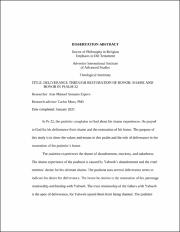| dc.description.abstract | In Ps 22, the psalmist complains to God about his shame experiences. He prayed to God for his deliverance from shame and the restoration of his honor. The purpose of this study is to show the values and means in this psalm and the role of deliverance in the restoration of the psalmist’s honor.
The psalmist experiences the shame of abandonment, mockery, and nakedness. The shame experience of the psalmist is caused by Yahweh’s abandonment and the cruel enemies’ desire for his ultimate shame. The psalmist uses several deliverance terms to indicate his desire for deliverance. The honor he desires is the restoration of his patronage relationship and kinship with Yahweh. The trust relationship of the fathers with Yahweh is the apex of deliverance, for Yahweh spared them from being shamed. The psalmist
desires to have the same deliverance and to be spared from shame. The feast/meal became the transition point of the status of the psalmist, from shame to honor.
Chapter 2 shows an overview of some Mediterranean and Mesopotamian values of patronage, kinship/family, and trust and the means such as forsakenness/ abandonment, taunt speeches, nakedness, and feast/meal. The study revealed that these Mediterranean and Mesopotamian values and means have similarities and differences with the same values and means found in Israel. It also revealed that deliverance is in some ways attached to these values and means in their respective contexts.
Chapter 3 holds that David, the king of Israel’s united monarchy, is the author of Ps 22. The analysis of Ps 22 revealed that the means of abandonment, taunt speech, and nakedness caused the psalmist shame. The value of patronage between Yahweh and the psalmist has to be reestablished to end the shame of abandonment and to restore relationship. The value of trust indicates the fathers’ loyalty to Yahweh. The trustworthiness of Yahweh to deliver the afflicted led to the fathers’ deliverance, causing them to avoid being shamed. The value of kinship indicates that Yahweh, as the psalmist’s progenitor, cared for and protected the psalmist like a father. That relationship kept the psalmist honorable. The means of feast/meal is the transition of the psalmist’s, together with those who were delivered, status from shame to honor. Also, the NT uses Ps 22 to portray the honor and shame of Jesus through the means of abandonment, taunt speech, nakedness, and the values of kinship/family and trust.
Chapter 4 surveys the different deliverance terms the psalmist used to convey his need for deliverance from shame. The deliverance terms indicate deliverance, rescue,
salvation, protection, and victory over the enemies. Yahweh favorably answers the psalmist’s prayer for deliverance, which is crucial to his restoration of honor.
Chapter 5 presents the theological analysis of the study. The analysis pointed that Yahweh acts as a faithful patron actively involved in the provision, protection, help, deliverance, salvation, and rescue of his people. Yahweh is holy, rejecting those who sin and putting them to shame but delivering the faithful from their shame. Yahweh keeps the honor of his people and does not leave them in utter shame. He is the host of the feast, allowing the transition of the afflicted from shame to honor.
The conclusion of the study indicated that in Ps 22, the social values of honor and shame exist. Patronage, kinship/family, and trust are honor values in Ps 22. Forsakenness/ abandonment, taunt speech, and nakedness are means to shame the psalmist. The feast/ meal presents the opportunity for the transition of the psalmist’s status, from shame to honor. Also, it showed that deliverance is the means for the restoration of honor. Yahweh actively provides the deliverance of the psalmist. | en_US |

